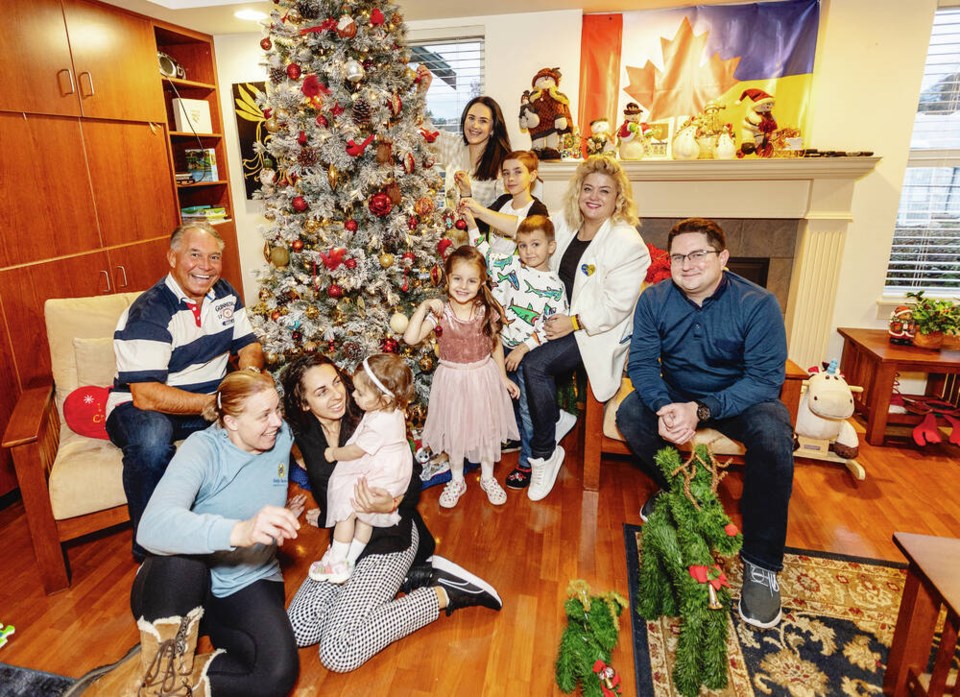Ukrainians fleeing war — many of them single women and mothers with children — are finding a safe haven in Greater Victoria, thanks in part to the Times Colonist Christmas Fund.
“Most of them arrive with a suitcase or two, some with nothing at all,” says Alec Rossa, vice-president of the Ukrainian Canadian Cultural Society of Vancouver Island.
He said as Russia continues its invasion and bombing in Ukraine, more refugees continue to arrive.
The Times Colonist Christmas Fund provided $100,000 in funding for resettlement through the charitable arm of St. Nicholas the Wonderworker Ukrainian Catholic Church last year.
Rossa said generous donations from TC readers created the “catalyst” to helping refugees on south Vancouver Island at the height of the war and when refugees started pouring in to the region.
Rossa said the money provided food for arriving families with groceries purchased through Fairway and Red Barn markets. It also paid for bus passes, driver’s tests, cellphone SIM cards and in some cases getting new phones, and financed the medical tests such as blood work, X-rays and exams that were required upon arrival.
The donation also helped to finance the creation of Ukrainian Village, a transitional housing community that 35 woman and children now call home as they adjust to life in a new city and culture.
“The Times Colonist Fund really got the ball rolling on the project … it was the seed money that started it all,” said Rossa.
The Kiwanis property on Cook Street, Heatherington House, was vacated earlier this year as previous senior residents were moved to a higher level of care and the Kiwanis Village Society considered different living arrangements for future residents.
The society offered the two-storey building to the Ukrainian community on an interim basis, and the transitional housing officially opened to refugees in August.
Several community groups jumped on board to make it a reality, including the Victoria Foundation, Capital Regional District, Help Ukraine Vancouver Island, the Kiwanis Club of Victoria, St. Nicholas the Wonderworker Ukrainian Catholic Church, the Ukrainian-Canadian Congress Victoria Branch and the Ukrainian Cultural Society of Vancouver Island.
Ukrainian Village is designed as a 90-day transitional home where refugees can live while they look for jobs and enroll their children in schools before moving on to their own homes.
The village has 15 rooms and can house 45 people. The dorm-style rooms have at least two single beds and a small kitchenette with a fridge, microwave and coffee maker, as well as a personal washroom with a shower. There is also a communal kitchen and living area.
“It’s a phenomenal project and we’re most proud of that,” says Karmen McNamara of Help Ukraine Vancouver Island, the agency assisting arriving refugees. “But it has its challenges. With 35 people living in various states of transition, they need English, they need [new] housing and they need food. That’s what the Times Colonist fund allows us to ensure.”
Other organizations and businesses have followed in ensuring the transitional housing came to fruition, said Rossa, noting that Gordie Dodd of Dodd’s Furniture supplied beds and bed frames and Kristen Stannix of Heirloom Linens supplied pillows, sheets and duvets.
As of this week, Help Ukraine Vancouver Island has welcomed 687 refugees to the Island. McNamara said of that total, 461 are adults (75% of whom are women), 91 are between the ages of 10 and 18, and 135 are under the age of 10.
McNamara said about two-thirds of the refugees end up with host families. To date, 198 matches have been found and more hosts are needed. She said Help Ukraine Vancouver Island asks for a minimum 90-day commitment to house and feed refugees, but it’s not uncommon to see a host family open their homes for up to six months, including some with a family of five.
“That’s a huge commitment,”says McNamara. “That’s feeding them, housing them, driving them …”
McNamara said Vancouver Islanders continue to support the refugees in other ways. Hockey and soccer groups have waived fees and communities have donated the necessary equipment for girls and boys to participate.
Two retired teachers are providing their time to teach refugees English twice a week at Ukrainian Village.
“Universally, the response has been positive from the community,” said McNamara. That goes for the general public, businesses and different organizations, she said. “Every time I ask, people find a way to say yes.”
Other fundraisers leading up to the holidays include the Knights of Columbus holding a Christmas dinner in Duncan on Dec. 11; a Christmas party with Ukrainian singers on Dec. 17 in Nanaimo; and a toy drive in Nanaimo to deliver gifts to refugee children. Check Ukrainehelpvi.ca for details and how to donate.
St. Nicolas parish is also holding a hot lunch and bake sale on Dec. 10 from 11 to 2 p.m., when you can buy authentic cabbage rolls and perogies. Proceeds will go to help settle refugees.
Rossa said the need for donations continues. With colder weather, winter clothing is imperative, and food is always the priority.
He said donations of clothing and other items are discouraged because the groups don’t have storage.
Gift cards to grocery stores and retailers like Walmart are preferred, as it gives the refugees autonomy to buy what they need, said McNamara.
She said cash donations also allow charitable groups to buy groceries in bulk at discounted rates, so the food dollar is stretched to reach more people.
McNamara said all the Island support is starting to move full circle. “We’ve got people who have been here for five or six months and they’re saying: ‘I’m settled now. I want to give back and how can I help?’
“If they can get to the point of being self-sustaining, they want to help others as well.”
How to donate to the Times Colonist Christmas Fund
• Donate online. Go to timescolonist.com/donate, which will take you to our CanadaHelps page. It is open 24 hours a day and provides an immediate tax receipt.
• Donate by mail. Send a cheque to the Times Colonist Christmas Fund, 201-655 Tyee Road, Victoria, B.C. V9A 6X5.
• Donate by phone. Use your credit card by phoning 250-995-4438 from 9 a.m. to 1 p.m. Monday through Friday.



